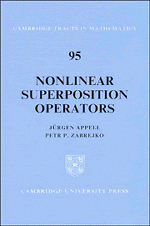Book contents
- Frontmatter
- Contents
- Preface
- Chapter 1 The superposition operator in the space S
- Chapter 2 The superposition operator in ideal spaces
- Chapter 3 The superposition operator in Lebesgue spaces
- Chapter 4 The superposition operator in Orlicz spaces
- Chapter 5 The superposition operator in symmetric spaces
- Chapter 6 The superposition operator in the spaces C and BV
- Chapter 7 The superposition operator in Hölder spaces
- Chapter 8 The superposition operator in spaces of smooth functions
- Chapter 9 The superposition operator in Sobolev spaces
- Bibliography
- List of Symbols
- Subject Index
Chapter 1 - The superposition operator in the space S
Published online by Cambridge University Press: 05 February 2012
- Frontmatter
- Contents
- Preface
- Chapter 1 The superposition operator in the space S
- Chapter 2 The superposition operator in ideal spaces
- Chapter 3 The superposition operator in Lebesgue spaces
- Chapter 4 The superposition operator in Orlicz spaces
- Chapter 5 The superposition operator in symmetric spaces
- Chapter 6 The superposition operator in the spaces C and BV
- Chapter 7 The superposition operator in Hölder spaces
- Chapter 8 The superposition operator in spaces of smooth functions
- Chapter 9 The superposition operator in Sobolev spaces
- Bibliography
- List of Symbols
- Subject Index
Summary
In this chapter we study the superposition operator Fx(s) = f(s,x(s)) in the complete metric space S of measurable functions over some measure space Ω. First, we consider some classes of functions f which generate a superposition operator F from S into S; a classical example is the class of Carathéodory functions, a more general class that of Shragin functions.
As a matter of fact, there exist functions f, called “monsters”, which generate the zero operator Fx ≡ θ, but are not measurable on Ω × ℝ, and hence are not Carathéodory functions; this disproves the old-standing Nemytskij conjecture. On the other hand, we show that a function which generates a continuous superposition operator (in measure) is “almost” a Carathéodory function.
We give a necessary and sufficient condition for the function f to generate a bounded superposition operator F in the space S. In particular, this conditions holds always if f is a Carathéodory function. On the other hand, we show that the superposition operator F is “never” compact in the space S, except for the trivial case when F is constant.
Finally, we consider superposition operators which are generated by functions f with special properties (e.g. monotonicity), and characterize the points of discontinuity of such operators.
The space S
Let Ω be an arbitrary set, M some σ-algebra of subsets of Ω (which will be called measurable in what follows), and µ a countably additive and σ-finite measure on M.
- Type
- Chapter
- Information
- Nonlinear Superposition Operators , pp. 7 - 38Publisher: Cambridge University PressPrint publication year: 1990



